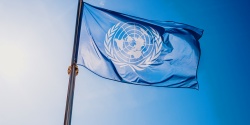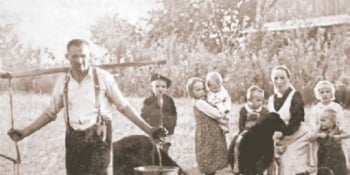Published: 17.01.2024

- A UN independent expert is preparing a report on the relationship between protection against discrimination based on sexual orientation and gender identity and the human rights to freedom of expression, association and assembly.
- The report is to be presented at the 56th session of the UN Human Rights Council.
- The Ordo Iuris Institute presented its opinion on the report.
- The Institute's experts pointed out, among other things, that already on the basis of the Constitution, the principle of equality before the law and the prohibition of discrimination covers everyone, regardless of their individual characteristics.
- On the other hand, the term "gender identity", to the extent that it is understood in isolation from the biological criterion, is an ideological concept.
The UN Independent Expert on Protection from Violence and Discrimination on the basis of Sexual Orientation and Gender Identity (SOGI) is preparing a thematic report for the 56th session of the Human Rights Council. The theme of the report is "Protection against violence and discrimination on the basis of sexual orientation and gender identity in relation to the human right to freedom of expression, association and assembly." To this end, the expert is seeking information on legal regulations on the protection of people from violence and discrimination based on sexual orientation and "gender identity" in UN member countries. The report will form the basis of the Council's work on the issue, which includes developing new guidelines and monitoring progress in complying with SOGI.
The report thus essentially has two objectives. First, to examine laws, practices and policies that, as the author points out, unlawfully restrict, explicitly or implicitly, freedom of expression, association and peaceful assembly based on sexual orientation or gender identity. On the other hand, the report will make recommendations to States and other stakeholders to ensure that their laws and policies are consistent with their obligations under international law.
In the submitted opinion, the Institute's experts pointed out that Polish legislation broadly protects against violence and discrimination, and implies equality before the law, which guarantees extend to everyone, regardless of their individual characteristics. They also pointed out that while the rights to freedom of assembly, association or freedom of speech enjoy broad freedom, the Polish legislature has also provided for control mechanisms when they are exercised in a manner inconsistent with their purpose.
In Poland, restrictions on freedom of assembly are regulated in the Law on Assemblies. This law specifies what types of assemblies are covered by the restrictions, what are the prerequisites for restricting freedom of assembly and what are the means by which freedom of assembly can be restricted. Thus, the Institute's experts pointed out that there are no grounds for claiming that the right to freedom of assembly in Poland can be exercised in a way that would violate the rights of SOGI or any rights of others. If violations of the law occur at any stage of an assembly, it can be dissolved.
The Institute's experts pointed out that freedom of association is one of the fundamental human rights guaranteed by the Constitution of the Republic of Poland. Freedom of association may also be restricted in certain cases, but only as provided by law and to the extent necessary to protect public order, public safety, public health or public morals. Restrictions on freedom of association may be imposed by law, but must be consistent with the Constitution and international law. A law introducing restrictions on freedom of association must specify what types of associations are covered by the restrictions, the grounds for restricting freedom of association, and the means by which freedom of association may be restricted. Thus, this right should be considered particularly important also because its restriction has restrictive premises.
Likewise, the constitutionally guaranteed right to freedom of expression and the acquisition and dissemination of information. The experts noted that the Constitutional Court, in interpreting Article 54 of the Constitution, pointed out that the word "view" used in its content, in accordance with the position taken in the jurisprudence of the Constitutional Court and the doctrine, should be interpreted as broadly as possible, not only as the expression of personal judgments about facts, but also suppositions and opinions.In the Court's view, Article 54(1) of the Constitution protects all lawful forms of expression that allow an individual to externalize and expose his or her own position, and living in a society in which freedom of speech is protected teaches tolerance for views different from one's own, which is essential for the normal functioning of a pluralistic society.
In the opinion, the institute stressed that human rights are subject to gradation, a point already made by John Locke in his 1690 work "Two Treatises on Government." Locke argued that there are certain rights that are inalienable and not subject to limitation, such as the right to life, liberty and property. The division of rights into absolute rights and relative rights was later adopted by other philosophers and jurists, such as Immanuel Kant, John Stuart Mill and Hans Kelsen.
In conclusion, the opinion noted that the term "gender identity" itself does not appear in any binding human rights act, and to the extent that it is interpreted in isolation from biological sex, it is an ideological term to which human rights should not yield.
"Poland has broad regulations on protection against discrimination that apply to all individuals. In the context of an interpretation that expands the catalog of human rights, which some people apply in a legally unjustified manner, often guided by emotions, instead of relevant and legally binding acts of international law, one cannot agree to limit other rights (such as freedom of assembly, association or expression) with an already well-established position and rank, not only in Poland, but in any democratic society," says Julia Ksiazek of the Center for International Law.

17.04.2025
• The Ordo Iuris Institute has prepared an opinion for the UN as part of a thematic report on surrogacy and its impact on the rights of women and children.

• Representatives of Ordo Iuris took part in the second round of consultations ahead of the 58th Session of the UN Commission on Population and Development (CPD58) on global health policy.

03.04.2025
• The Advocate General of the Court of Justice of the European Union (CJEU) has issued an opinion in a case involving a same-sex couple’s demand for their German marriage to be recognized as a marriage in Poland.

24.03.2025
On the 81st anniversary of the martyrdom of the Ulma family and the Jews they sheltered—who died at the hands of the German occupiers of Poland—the Ordo Iuris Institute is releasing a special commemorative infographic.